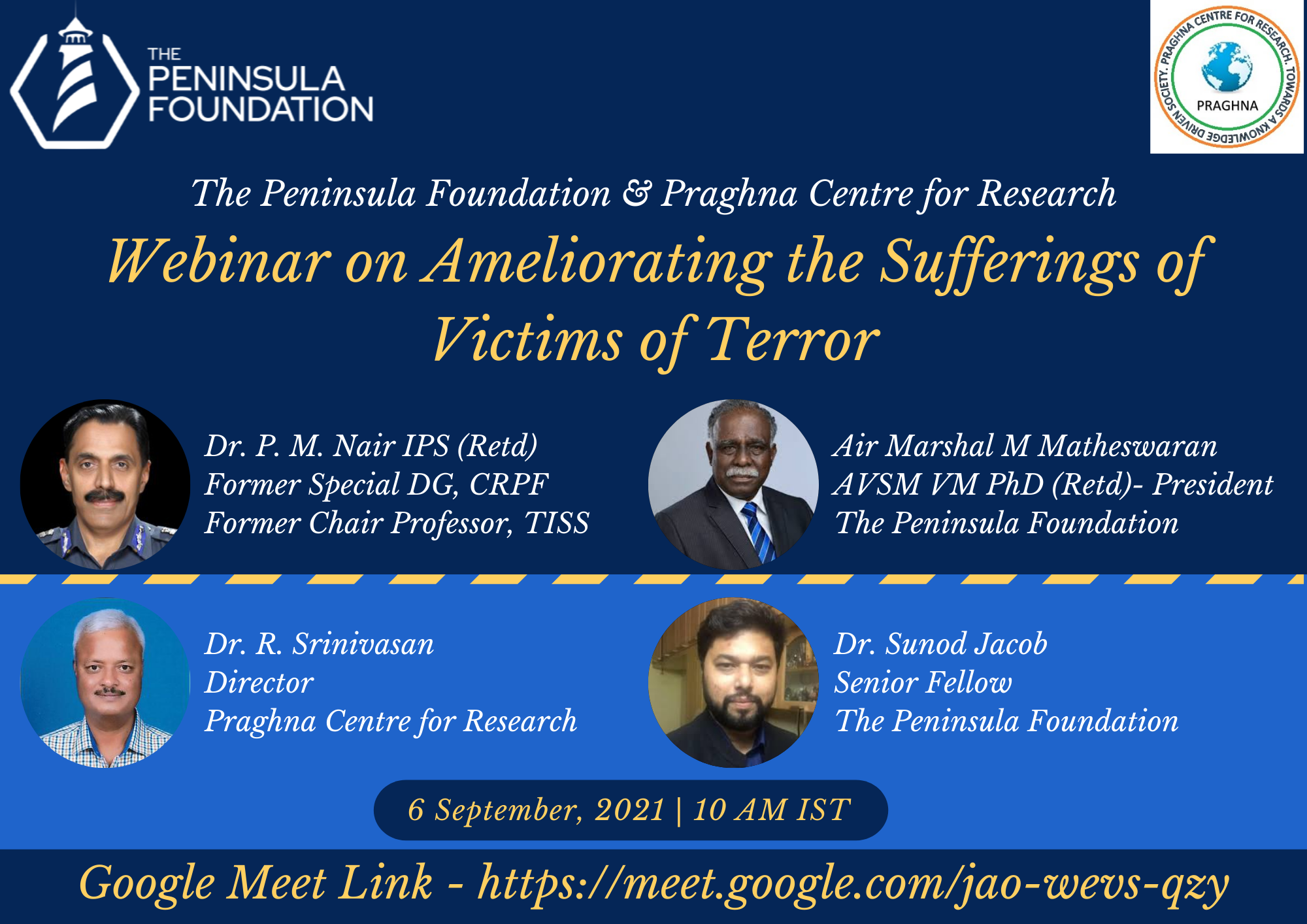Webinar on Ameliorating the Sufferings of Victims of Terror
The Peninsula Foundation & Praghna Centre for Research

Terrorist violence across the world has claimed more lives than many of the conventional armed conflicts in the contemporary world. Global Terrorism Index and other data show that over the previous decade, 2001-2010) the average number of annual deaths was 21,000. However, over this decade the global death toll ranged from its lowest of 7,827 in 2010 to the highest year of 44,490 in 2014. In 2019, 13586 people lost their lives due to acts of terrorism. While experts note that death due to terrorist acts are showing a decline, the incidence of violence has manifested in other forms. For example, the United Nations notes that:
“Today, crime kills far more people than armed conflicts. In 2017, almost half a million people across the world were killed in homicides, far surpassing the 89,000 killed in active armed conflicts and the 19,000 killed in terrorist attacks. If homicide rates keep climbing at the current rate of 4 per cent, then Sustainable Development Goals 16 – which includes a target ‘to significantly reduce all forms of violence and related death rates everywhere’ – will not be met by 2030”.
Loss of life due to acts of terror is not the only concern related to terrorism. It is also the plight of families that lose breadwinners, cases of maiming and disability, violating the dignity of women victims, killing/maiming of children that result in lifelong mental trauma for the survivors and their families. Recognizing the need to address these issues, United Nations urged member nations to chalk out rehabilitative assistance in monetary and other substantial forms through its many resolutions.
India on its part, implemented a fivefold scheme to address the plight of victims, their kin and especially children.
1. A Central Scheme titled Central Scheme for assistance to civilian victims/families of victims of terrorist, communal and Naxal violence was implemented with effect from 1.4.2008 providing for financial compensation of INR 300000 to the victims’ family.
2. Those permanently incapacitated and members of the family of the victims killed are entitled to a health card given by the District Health Society under the National Rural Health Mission. This would entitle the cardholders to free medical treatment in respect of injuries and all other major illnesses caused due to violence.
3. Medical care is also provided to the beneficiaries of the Scheme as a special case under the on-going scheme of the Ministry of Health and Family Welfare, viz., Rashtriya Arogya Nidhi (RAN).
4. For the educational needs of the children of the victims, victims’ families are entitled to assistance under the project “Assist” implemented by the National Foundation for Communal Harmony. The scheme provides for financial assistance to the children rendered orphan or destitute.
5. The Code of Criminal Procedure Act was amended in the year 2009 to provide for a Victims compensation scheme that obligates every State Government (in collaboration with the Central Government) to prepare a scheme for providing funds for the purpose of compensation to the victims or his dependents who have suffered loss or injury as a result of the crime and who require rehabilitation.
Objectives of the Webinar
In the light of the above the webinar aims to explore the following broadly:
1. Terrorism and its manifestations in India – Causes and Concerns
2. Understanding the socio-economic challenges for victims and their families
3. Exploring the adequacy of policy provisions to address the needs of victims/families
4. Interface of government and civil society organizations for victim relief
Program Details –
Download
Hourly Schedule
Program Details
- 10:00 - 10:05
- Welcome & Introductory Address
- Dr R Srinivasan, Director, Praghna Centre for Research
- 10:05 - 10:25
- Presidential Address
- Air Marshal M Matheswaran AVSM VM (Retd), PhD, President, The Peninsula Foundation
- 10:25 - 10:50
- Special Address
- Dr PM Nair, IPS (Retd), Former Special DG, CRPF & Former Chair Professor, TISS, Mumbai
- 10:50 - 11:00
- Webinar Session: Dr Sunod Jacob (Chair)
- Introduction of Chair & Opening Address
- 11:00 - 11:20
- Terrorist attack: The Psychological response of the survivors
- Dr KS Vidusha, Associate Professor, Rajarajeswari Medical College and Hospital, Bangalore
- 11:20 - 11:40
- An Analytical Study on Terrorism and its Causes in India
- Dr Bala Thirupura Sundari, Asst Prof, Savitha School of Law, Chennai
- 11:40 - 12:00
- Legal Mechanisms to Mitigate the Sufferings of Victims of Terror
- Dr KS Indirani, Associate Professor, Bishop Cotton College of Law for Women, Bangalore
- 12:00 - 12:20
- Economic Impact of Terrorism in Jammu & Kashmir
- Ms. V Pattammal, Research Scholar, Department of Business Administration, Annamalai University
- 12:20 - 12:30
- Remarks by Chair
- 12:30 - 12:45
- Open Forum-Q&A
- 12:45 - 12:55
- Concluding Remarks
- Air Marshal M Matheswaran AVSM VM (Retd), PhD
- 12:55 - 1:00
- Vote of Thanks
